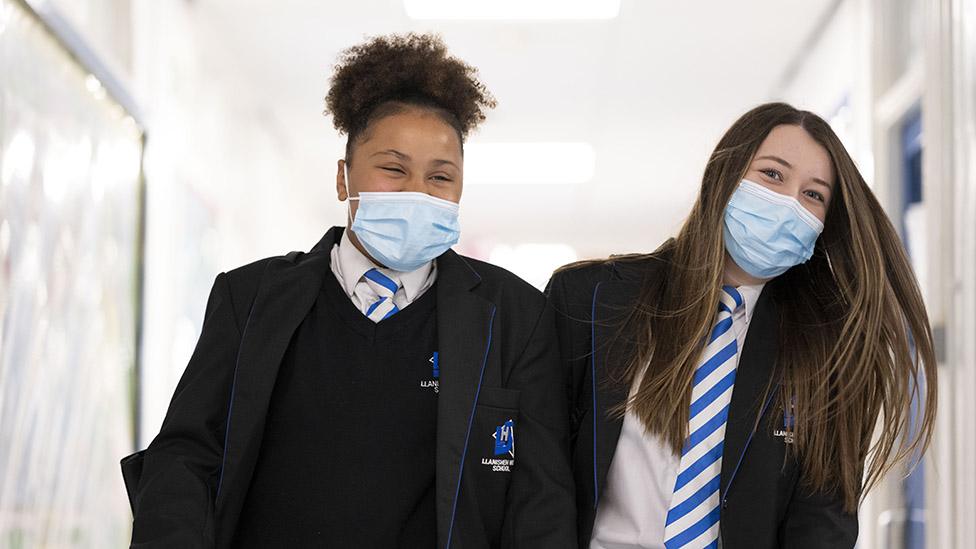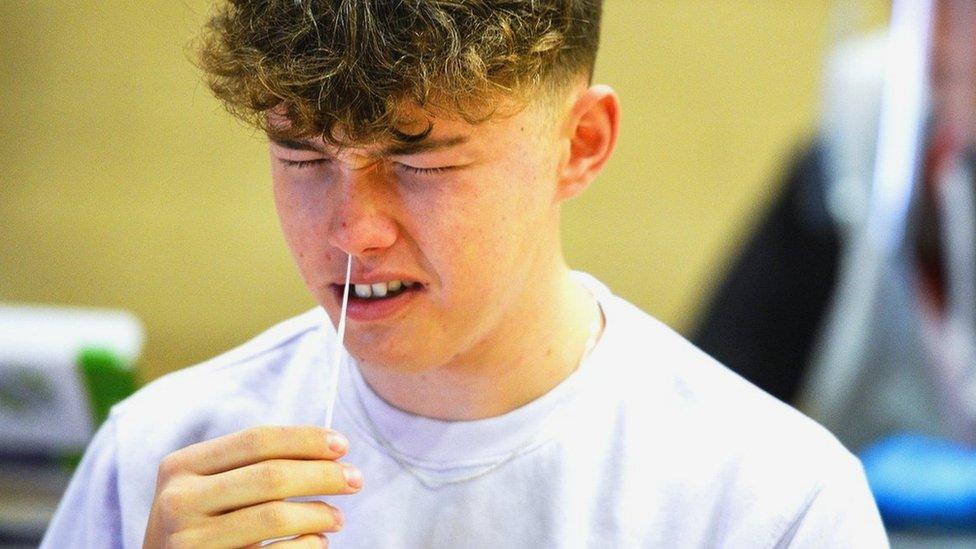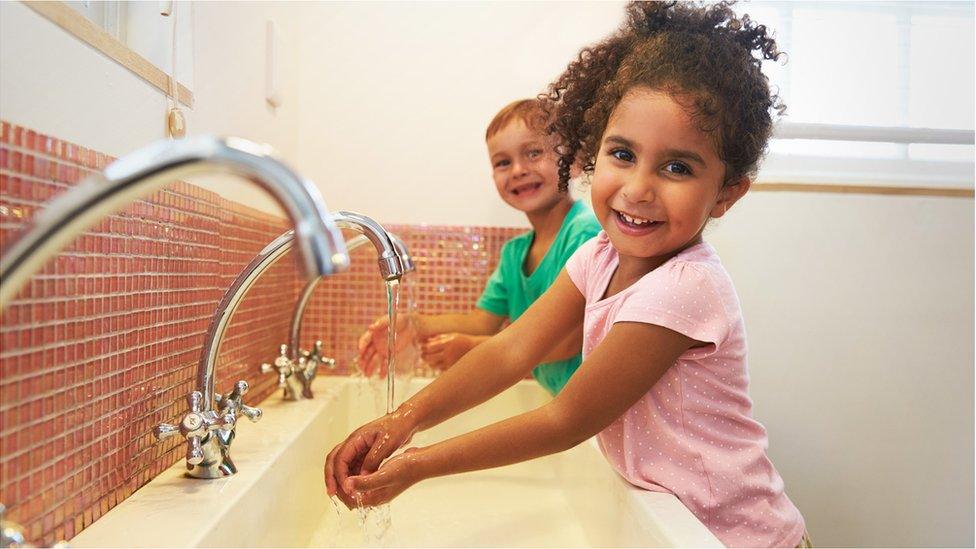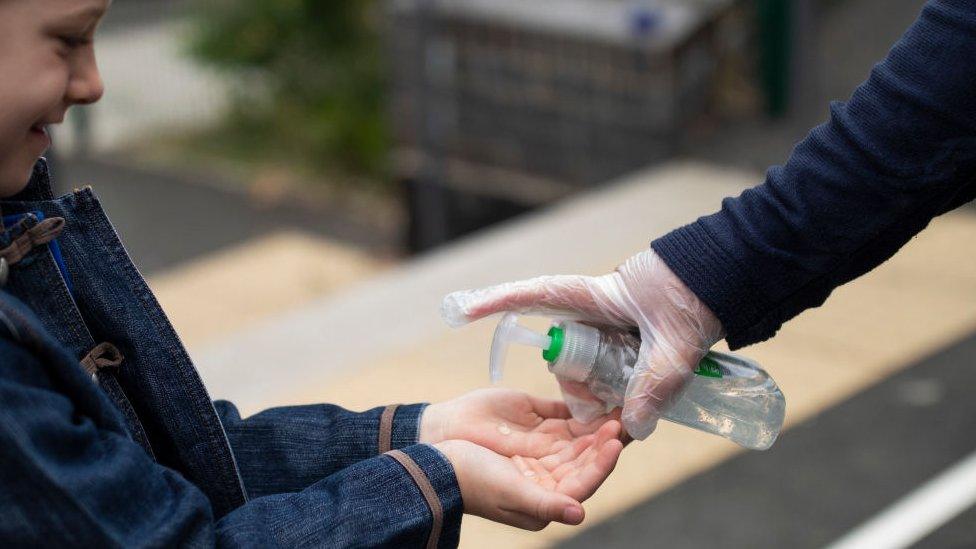How are Covid rules changing across UK schools?
- Published

All remaining Covid restrictions have now been scrapped in English schools.
Rules have also been eased elsewhere in the UK, but some measures are being retained for the moment.
How are the Covid rules changing in schools?
Staff and students without symptomsin England are no longer asked to test for Covid twice-weekly. Secondary school pupils also don't need to wear masks.
The legal requirement to self-isolate after a positive test is also being removed, although it is still recommended.
Head teachers groups have warned that the changes to testing and self-isolation "may actually lead to an increase in disruption", as Covid is more likely to spread in the classroom, leading to further pupil and staff absence.

All school staff and secondary school pupils in Scotland and Northern Ireland are still asked to take two lateral flow tests (LFTs) a week (three in Wales).
In Wales, schools are largely back to normal, external. Face coverings will no longer be required in classrooms after 28 February, but should still be worn in communal areas of secondary schools.
In Northern Ireland, schools reopened with the same measures as last term. If a primary or post-primary class has multiple Covid cases, all pupils should take an LFT. The guidance that pupils in post-primary schools should wear face coverings still applies.
In Scotland, social distancing remains in place. However, pupils will no longer have to wear masks in school from 28 February.
How many teachers and pupils are off because of Covid?
The latest data, external for England shows that 182,000 pupils (2.2%) of pupils were absent for Covid-related reasons on 10 February, down from 320,000 (3.9%) on 3 February.
On the same date, 2.8% of teachers and school leaders and 2.5% of teaching assistants and other staff were absent due to Covid, down from 4.4% and 4.1% respectively the previous week.
Almost half England's schools (45%) had one in 20 teachers absent due to Covid.
In Scotland on 17 February, 12,638 students (2.4%) were missing from school, external due to Covid-related reasons. The highest absence rate this year was seen on 7 January, when 43,565 students (14.1%) were off.
In Northern Ireland, 5.2% of students, 9% of teachers and 11% of classroom assistants in schools were absent due to Covid over the week 24 to 28 January - the highest rates since the new term began.

Many schools have told the BBC they have struggled to find temporary staff to cover the teachers who are off.
England's Education Secretary Nadhim Zahawi urged retired teachers to return and join teacher supply agencies to fill gaps, but a BBC survey suggested there had been a limited response.
Mr Zahawi also suggested schools could merge classes. But teaching unions said there were logistical difficulties and safety issues with teaching large groups of children.

Can a child go to school if they or someone in their household or class has Covid?
After Thursday 24 February, people in England with Covid will no longer have a legal obligation to self-isolate.
However, people who test positive will still be advised to stay at home and avoid contact with others for at least five full days, including school staff and students.
The legal requirement to self-isolate remains in place across Scotland, Wales and Northern Ireland.
As long as they don't have Covid symptoms, under-18s already don't have to self-isolate if someone else in their household has Covid.
Similarly, whole classes are no longer automatically sent home to isolate if a pupil or teacher tests positive.
However, close contacts aged five or above are strongly advised to test for at least seven days.
All primary and post-primary pupils in Northern Ireland are advised to take an LFT if there are multiple Covid cases in their class.
Which pupils are being vaccinated?
All children aged five to 11 in the UK will be offered a low-dose vaccine, which is being rolled out on a "non-urgent" basis.
It's expected to be offered in England in April, and plans are also under way in Scotland, Wales and Northern Ireland.
In addition:
the low-dose vaccine is already being offered to five to 11-year-olds with medical conditions that put them at greater risk
all children aged 12 and over are being offered two doses of the Pfizer jab
sixteen and 17-year-olds who had a second vaccine dose at least three months ago can have a booster
the JCVI has also recommended, external that the booster is also offered to children aged 12-15 who are in an at-risk group or live with someone who is immunosuppressed
Children who aren't at high risk from Covid should wait 12 weeks after a positive test before having a jab.
How will exams work this year?
Grades will again be decided by external marking, instead of the teacher assessments used in 2020 and 2021, but grade boundaries will be more lenient in England, Wales and Scotland.
English exam boards have published details about this year's GCSE, AS and A-level papers for most subjects, including maths, biology, chemistry and languages.
Students taking GCSE exams in English Literature, geography, history and ancient history won't have to answer questions on one option from their course.
In maths and science exams, students will be given sheets of formulae and equations.
Students taking vocational B-Tec qualifications will have fewer internal assessments.
Qualification Wales, the Scottish Qualification Authority (SQA) and Northern Ireland's CCEA exam board have already set out their plans to ensure candidates' work is fairly assessed.